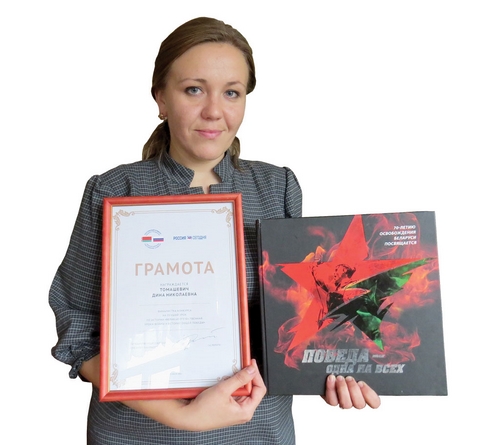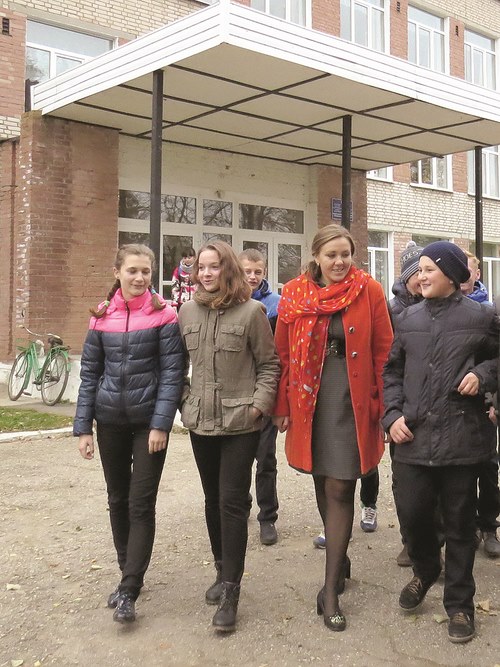Last summer, the results of a new competition by the Union State for teachers entitled ‘The Great Patriotic War: Lessons and the History of Victory’, were summed up. Young history teachers under the age of 28 were among the participants. They developed a sample lesson plan and provided it to the jury. A secondary school teacher, from Vitebsk School’s Verkhnedvinsk, Tomashevich Dina, dedicated her lesson to the military photojournalist Khandogin Nikolay, who worked in besieged Leningrad. The organisers of the contest appreciated the teacher’s development of the theme of personal and collective heroism during the war and her original description of the facts. As a result, Dina was placed third. Recently, our reporter met the talented teacher.

Dina has kindly invited me to attend a lesson in her 8B class, devoted to Rzecz Pospolita and Belarus as its part in the 16th-18th century. The teacher emotionally described the lives of the villagers of the time, the history of small towns (which were communities for artisans and trades people) and their turning into cities that gained the Magdeburg Charter. Dina says that the times of the Rzecz Pospolita and Grand Duchy of Lithuania are her favourite topics on the school curriculum devoted to the history of the native land.
“I acquired this love owing to the wonderful teachers of the Polotsk State University’s History Department where I studied. I was born in Miory District’s Uzmeny, graduating from the local secondary school. My village is situated 10km from Verkhnedvinsk. After entering the University, I faced an interesting situation. On leaving small towns for large cities, my peers mostly used to speak Belarusian less — turning to Russian. However, almost all lectures at the Polotsk State University were in Belarusian. I began attending its history and culture club — Knyazhich — and became interested in Belarusian ethnography.

Remarkably, there are young talented colleagues with whom it’s possible to share the accumulated material
Heaven-sent teacher
The lessons of Ms. Tomashevich, who lectures to 5th-11th grade pupils, begin at 8a.m. To get to school in time, we have to get up at six. Dina usually drives her small Peugeot 206 but, sadly, it has broken down. Many travel to their jobs to the district centre from Uzmeny in the morning. After six lessons of history, the teacher held ‘a class hour’ and then talked to pupils’ parents. We were able to continue our talk after 3p.m.
How did you become a participant in the Union State contest?
There are only a few young teachers of history in Verkhnedvinsk. When I was asked to defend the honour of our district, I consulted our school counsellor: Natalia Tomashevich. Interestingly, she does not only bear the same family name but is also my former teacher. She was my history teacher in Uzmeny and then moved to Verkhnedvinsk. Natalia is a true heaven-sent teacher. In Uzmen, she established a school museum, where we senior school pupils prepared stands, placing ourselves in the role of guides. I chose my profession owing to her influence. As regards the Union State contest, it was Ms. Tomashevich who advised me on the choice of topic. I learnt that the military press photographer Khandogin lived in the village of Volyntsy (in Verkhnedvinsk District) before the war. On the eve of the Great Patriotic War, he served in Leningrad Military District. When the Germans attacked the Soviet Union, he was appointed a military photographer for the central army newspaper: ‘Krasnaya Zvezda’ (Red Star). After the victory, he stayed in Leningrad but often came to his small homeland — also meeting schoolchildren and corresponding with them. He died in 1989 and was buried in his native Volyntsy.
What did you appreciate most in the awards ceremony?
I was awarded a letter of recognition, an e-tablet and large, beautifully illustrated books about the Great Patriotic War. In addition, all finalists were invited to organised excursions and seminars. I mostly appreciated communicating with Yuri Vyazemsky — the host of the ‘Umniki i Umnitsy’ (Clever Boys and Clever Girls) TV programme, as well as a master class by the Honoured Teacher of Russia — Igor Karachentsev. The latter offered us a demonstration lesson, revealing the soul of his native St. Petersburg via the prism of besieged Leningrad. He masterfully linked the war with our modern times; all listeners, including me, were enraptured.
School of lecturing in the hinterland
In Verkhnedvinsk, Ms. Tomashevich is in her third year. Previously, she was a village teacher in Ushachi District’s Kosari (where she was sent after graduating from the University). The young woman admits that the hinterland has its advantages as well, “Life, including school, was moving slowly. However, I was not provided with accommodation in Ushachi and, it was virtually impossible to rent a flat earning just Br4m (around 14,500 Russian Roubles). I had the chance to be employed at the district culture department: I was invited there after my pupils won a regional festival of folk art (they danced and I sang during the competition). Although the proposed salary was even lower, I was ready to stay in Ushachi District. Unfortunately, my father fell seriously ill and I had to move closer to him.”
Dina treats everything related to her school subject seriously, “It seems to me that pupils view history as a minor subject: they think that it’s enough to learn a paragraph and answer! I want them to understand and analyse it. Sadly, there is little time for this at school: two history lessons per week (world history and the history of Belarus) are not enough. Moreover, there is no exam after the 9th year at school — which doesn’t contribute to the promotion of the subject. I want to awaken young people’s national consciousness, ensuring they are proud of their country and its history.”
We said goodbye about six in the evening. Dina hurried to the District House of Culture for the rehearsal of the ‘Yarytsa’ ensemble, which performs Belarusian folk songs at the ‘Slavianski Bazaar’, the festival of village workers — ‘Dazhynki’, and many other contests. Singing is probably Dina’s main hobby. She also loves to embroider, grow flowers and read. Among her favourite books are ‘Ears Under Your Sickle’ and ‘The Wild Hunt of King Stakh’ by Vladimir Korotkevich. She plans to go travelling in summer, visiting Nesvizh, Vilnius and St. Petersburg — the cities which occupy a great role in Belarusian history.
Colleagues
Larisa Devyakovich is a history teacher in Verkhnedvinsk’s school #2, the superintendent of the school history museum and a teacher with over 40 years experience. She comments, “I was extremely happy with Dina’s success. Remarkably, there are young talented colleagues with whom it’s possible to share the accumulated material. Our museum keeps many unique exhibits. Among them are documents dealing with the activities of a special guerrilla unit of the BSSR’s People’s Commissariat for State Security — Combat and the Proshkovskaya Komsomol international underground organisation (a monument to it is erected near the Mound of Friendship). There, by the Mound, we former soldiers of the 119th Infantry Division of the Order of Suvorov which freed Verkhnedvinsk from Nazi invaders in 1944. Some of them came from Russia. With this in view, our students are aware of the joint heroic struggle of Soviet people during the war not just from textbooks.
By Sergey Golesnik











